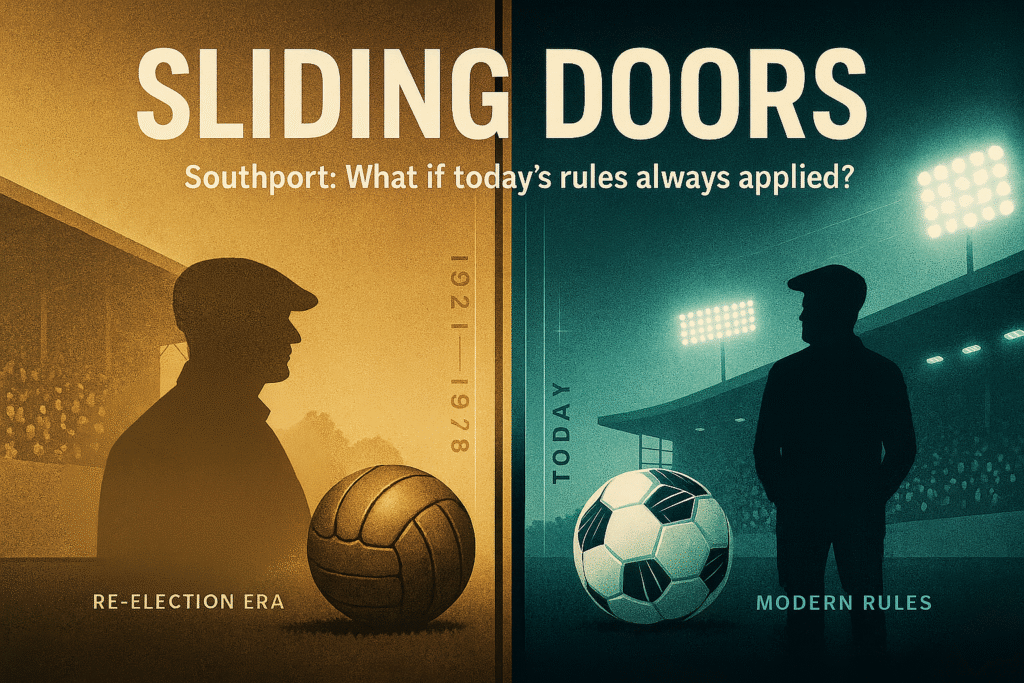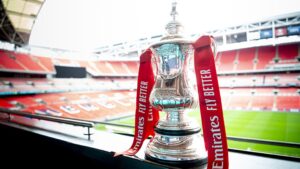Football is never static. The rules that decide promotion, relegation and even how points are awarded have shifted over time, and some of the most significant reforms only arrived in the last fifty years. Goal difference replaced goal average. Three points replaced two. The play-offs created fresh jeopardy. Automatic relegation ended the safety net of re-election.
But what if those rules had always been in place? Would Southport’s story in the Football League, from 1921 to 1978, look any different?
Goal Average to Goal Difference
Until 1976–77, league tables were separated by goal average with goals scored divided by goals conceded. This favoured defensive teams who eked out narrow wins, because 1–0 looked better on the ratio than 4–2. The switch to goal difference was made to encourage more attacking football.
For Southport, this change makes no material difference. Every season recalculated with goal difference instead of goal average ends the same way – the promotion years remain promotions, the relegations remain relegations, and the re-elections remain re-elections.
Two Points to Three
From 1981–82 onwards, the League awarded three points for a win rather than two, to reward victories and discourage safety-first draws.
Re-running Southport’s seasons with three points changes almost nothing:
1966–67: They finish 3rd instead of 2nd, but with four going up, promotion is still secured.
1972–73: They are still Fourth Division champions, with only the chasing pack reordered (Cambridge miss out; Aldershot and Newport sneak in).
No other season shifts in a way that changes Southport’s fate.
The Play-offs
The play-offs were introduced in 1986–87, initially as an experiment but soon established as a permanent feature. Today they offer a promotion chance to clubs finishing just outside the automatic places.
Had they existed earlier, Southport would have had three genuine play-off opportunities:
1924–25: 4th in Division Three North.
1955–56: 5th in Division Three North.
1966–67: 2nd in Division Four (3rd on modern scoring).
A possible fourth comes in 1971–72 (7th in Division Four), depending on format.
But the reality is mixed: in 1925 and 1956, the play-offs would have offered a chance at a prize that never came. In 1967, they would have put at risk the one promotion Southport actually achieved.
Re-election to Automatic Relegation
Here lies the real sliding doors moment.
Until the 1980s, there was no automatic relegation from the Football League. The bottom clubs had to apply for re-election, leaving their fate to the votes of their peers. Southport endured this ordeal 11 times in total, surviving ten of them before finally being voted out in 1978 in favour of Wigan Athletic.
Had the modern rule of automatic relegation for the bottom two existed:
1958–59: (24th in Division Four): Southport would have gone straight down in the very first season of the restructured league.
1975–76, 1976–77, 1977–78: (23rd in Division Four each year) – three consecutive automatic relegations.
And that changes everything.
If Southport had been relegated in 1959, the later glory years – promotion in 1966–67 and the Fourth Division title in 1972–73 – would never have happened. There would have been no return to Division Three, no championship to celebrate.
What’s more, the non-league landscape was very different. The Northern Premier League didn’t form until 1968, and the Alliance Premier League (later the Conference, now the National League) until 1979. In 1959, Southport would most likely have dropped into the regional Lancashire Combination or Cheshire County League. That’s a very different world, with no clear pathway back to the Football League.
It’s only because of the re-election system – often derided as an “old boys’ club” stitch-up – that Southport clung on. And it’s only thanks to that reprieve that the club was still around to achieve its proudest moments a decade later.
Sliding Doors
Apply modern scoring systems – three points for a win, goal difference instead of goal average – and Southport’s history is virtually unchanged. Add play-offs, and they gain a few extra “what if” opportunities, but nothing is guaranteed.
It is only when you change the mechanism of relegation that the story truly diverges. Automatic relegation in 1959 would likely have sent Southport into the Lancashire Combination wilderness, ending their League life almost before it had begun. Their greatest triumphs – promotion in 1967 and the 1973 title – would never have happened.
So while modern reforms make the game sharper, fairer and more exciting, Southport’s history reminds us of a paradox: the much-maligned re-election system, for all its faults, was the only reason the club lived long enough to write its proudest chapters.
| Season | Division | Actual Finish | Modern Outcome |
|---|---|---|---|
| 1921–22 | Div 3N | 14th | No change |
| 1922–23 | Div 3N | 11th | No change |
| 1923–24 | Div 3N | 7th | No change |
| 1924–25 | Div 3N | 4th | Play-off place under modern rules |
| 1925–26 | Div 3N | 17th | No change |
| 1926–27 | Div 3N | 10th | No change |
| 1927–28 | Div 3N | 15th | No change |
| 1928–29 | Div 3N | 11th | No change |
| 1929–30 | Div 3N | 8th | No change |
| 1930–31 | Div 3N | 10th | No change |
| 1931–32 | Div 3N | 15th | No change |
| 1932–33 | Div 3N | 8th | No change |
| 1933–34 | Div 3N | 13th | No change |
| 1934–35 | Div 3N | 21st | Re-election (unchanged) |
| 1935–36 | Div 3N | 21st | Re-election (unchanged) |
| 1936–37 | Div 3N | 15th | No change |
| 1937–38 | Div 3N | 10th | No change |
| 1938–39 | Div 3N | 12th | No change |
| 1946–47 | Div 3N | 15th | No change |
| 1947–48 | Div 3N | 13th | No change |
| 1948–49 | Div 3N | 21st | Re-election (unchanged) |
| 1949–50 | Div 3N | 19th | No change |
| 1950–51 | Div 3N | 21st | Re-election (unchanged) |
| 1951–52 | Div 3N | 17th | No change |
| 1952–53 | Div 3N | 18th | No change |
| 1953–54 | Div 3N | 17th | No change |
| 1954–55 | Div 3N | 11th | No change |
| 1955–56 | Div 3N | 5th | Play-off place under modern rules |
| 1956–57 | Div 3N | 10th | No change |
| 1957–58 | Div 3N | 10th | No change |
| 1958–59 | Div 4 | 24th | Automatic relegation under modern rules |
| 1959–60 | Div 4 | 21st | No change |
| 1960–61 | Div 4 | 14th | No change |
| 1961–62 | Div 4 | 17th | No change |
| 1962–63 | Div 4 | 13th | No change |
| 1963–64 | Div 4 | 20th | No change |
| 1964–65 | Div 4 | 20th | No change |
| 1965–66 | Div 4 | 10th | No change |
| 1966–67 | Div 4 | 2nd (promoted) | 3rd (still promoted); Play-off place today |
| 1967–68 | Div 3 | 14th | No change |
| 1968–69 | Div 3 | 8th | No change |
| 1969–70 | Div 3 | 22nd (relegated) | Relegated (unchanged) |
| 1970–71 | Div 4 | 8th | No change |
| 1971–72 | Div 4 | 7th | Possible Play-off place depending on format |
| 1972–73 | Div 4 | 1st (champions) | Still champions; different play-off qualifiers |
| 1973–74 | Div 3 | 23rd (relegated) | Relegated (unchanged) |
| 1974–75 | Div 4 | 11th | No change |
| 1975–76 | Div 4 | 23rd | Automatic relegation under modern rules |
| 1976–77 | Div 4 | 23rd | Automatic relegation under modern rules |
| 1977–78 | Div 4 | 23rd (lost re-election) | Automatic relegation under modern rules |
Disclaimer: This article is a retrospective exercise in applying today’s rules to past seasons. All recalculations are based on published Football League tables and adjusted only where modern scoring systems would have altered the outcome.
Discover more from Southport Central
Subscribe to get the latest posts sent to your email.

 1 - 1 v Chorley (H) 21/10/2025
1 - 1 v Chorley (H) 21/10/2025 




More Stories
The Price Of Saying No
Friday Night Football
Fifty Years On: Counting the Cash, Missing the Moment